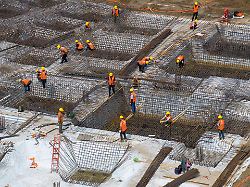PMI increases
China’s economy may have bottomed out
September 30, 2023, 10:37 a.m
Listen to article
This audio version was artificially generated. More info | Send feedback
The world’s second-largest economy expanded its production activity again in September. The government’s aid was having an effect, says an analyst. However, the problem child is and remains the real estate sector.
China is sending growth signals again. Manufacturing activity in the world’s second-largest economy rose in September for the first time in six months. The Purchasing Managers’ Index (PMI), based on a survey of major manufacturers in China, rose to 50.2 from 49.7, the National Bureau of Statistics said. The value is just above the 50-point mark, which signals growth, and also slightly exceeded the forecast.
China’s non-manufacturing PMI, which includes sub-indices for services and construction, also rose to 51.7 from 51.0 in August. The composite PMI, which includes manufacturing and non-manufacturing sectors, rose to 52.0 from 51.3 in September. “The manufacturing PMI and strong industrial profits numbers suggest that the economy has gradually bottomed out,” said Zhou Hao, chief economist at Guotai Junan International.
More stable economic indicators will be welcomed by policymakers as they continue to grapple with the housing debt crisis that has rocked global markets. Authorities have announced a number of measures to support the property market, including cutting mortgage rates.
Analysts say more policy support will be needed for China’s economy to meet the government’s growth target of about 5 percent this year. “China’s economy has stabilized, partly due to policy easing in the real estate sector,” said Zhiwei Zhang, chief economist at Pinpoint Asset Management. “The key question going forward is whether tax policy will be supportive. I think it will be. However, in terms of timing, the change in fiscal policy course could be implemented next year rather than this year.”
